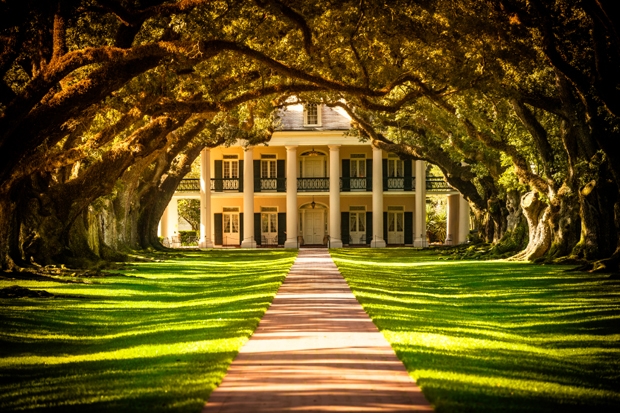During the first ten pages of this long work Paul Theroux, on a journey through the American South, meets two citizens of Alabama. The first, encountered in Tuscaloosa when he asked the way to the Cornerstone Full Gospel Baptist Church, was named Lucille, called him ‘Mr Paul’, said ‘Ain’t no strangers here, Baby’, took him to the church and said ‘Be Blessed’ when they parted. The second, a citizen of Gadsden, was named Wendell, called him ‘Sir’, clamped him on the shoulder, said ‘Kin Ah he’p you in inny way?’ and before they parted suggested they meet again for ‘a sandwich, peanuts or anything’.
In neither encounter, in a part of the world where racial sensibilities are probably more intrusive than anywhere else, does Theroux happen to mention whethereither Lucille or Wendell was black or white — they were simply representative of what he calls the comforting embrace, or alternatively the unrelenting grip, of the Deep South — the part of the country, that is, that formed the slave states of the old Confederacy.
Theroux has sometimes been accused of misanthropic responses. He has been a generous friend of mine for many years, though, and I hope I will not be accused of bias when I say that none of his previous travel books has so well illustrated the depth of his humanity, at once worldly, detached and sympathetic, as does this diligent work about the American South — the first he has written about his own country.
It is not really a travel book at all, except in the most elementary way. It involves travel, of course, because as it happens the world-wandering Theroux has never been to the South before, so his several lengthy incursions into the lands of the Lucilles and the Wendells have necessarily entailed motorised meanders down there. But Deep South is more truly a work of philosophy and analysis than of movement, and indeed includes some sharpish criticisms of conventional travel writing and its compulsory hardships. We do not suffer even a puncture or a shortage of gas as we potter around with Theroux down there below the Mason-Dixon Line. The most unpromising salesmen are perfectly polite. Nearly every cop seems to be a gentleman. Countless are the Lucilles and the Wendells who treat him to sandwiches or peanuts. Black, white or indeterminate, nearly everyone seems resolved to bring out the best in Mr Paul, and they almost always succeed.
Much of what he tells us about his journeys is familiar even to a foreigner — less surprising, actually, than it is to him — and as always in his writing it is the infinite massing of detail that gives the narrative its power. He largely ignores the big cities of the South, but seems to me to offer unmatched interpretations of the region as a whole, and I have isolated from the book’s 400-odd pages two themes to represent his vision of the Matter of the South.
The first is religion. In black communities as in white, in every last hamlet of the seven states he finds one pre-eminent Christian church or another. The vigour, charm and grotesquery of Southern evangelicalism are familiar to us all by now, and for Theroux they provide a true leitmotif. A church down there, he says, is like a mosque or a temple in India or Africa — central to life itself. Three thousand bikers turned up when the Christian Motorcyclists Association held its annual meeting in Arkansas, ‘riding’, as they said, ‘for the Son of God’ — and even a gun show, where everyone present agrees on at least one subject, suggests to him ‘a large, hospitable church’. JESUS IS LORD, as one such event indeed proclaimed, WE BUY AND SELL GUNS. Whatever your race, it seems, the convictions of your community church provide a sense of identity as of protection, even as the rural slums confirm all the dread predictions of the Book of Revelation.
And then of course there is the matter of race, which inevitably infests Theroux’s profoundly liberal theme, and which is exemplified for me here by the conclusion of a tale concerning hideous racial prejudices in the 1950s, told in reminiscence by a white planter of Mississippi. This is how it ends:
We took one man out and whipped him and told him to be back at work the next day. Ever since then, whenever he sees me, he tips his hat and has been a good nigger ever since.
Doesn’t that cast a chill? Not so very long ago. I myself first wrote about the Deep South in 1954, and I remember too well the latent sense of menace that hung about society then, and threatened anything I wrote about race. Even now, although this book contains little of the old horrific prejudices, colour, like cheerfulness, keeps breaking in, and gives Theroux telling passages of history and literature, and moments of irony too.
The prevailing atmosphere of the book, though, is gently valedictory. Now and then there is a Chekhovian feel to it. It ends with a meditative farewell not so much to the mystique of the Deep South, with all its allures, folk-memories and contradictions, but to the author’s own youth. ‘What sort of things do you write, Mr Thorax?’, this septuagenarian world celebrity is asked once during his journey, but he does not resent the implication. ‘The deep South made me feel,’ he writes, ‘like a fortunate traveller in an overlooked land.’ And this book does both the land and his own grand reputation proud.






Comments